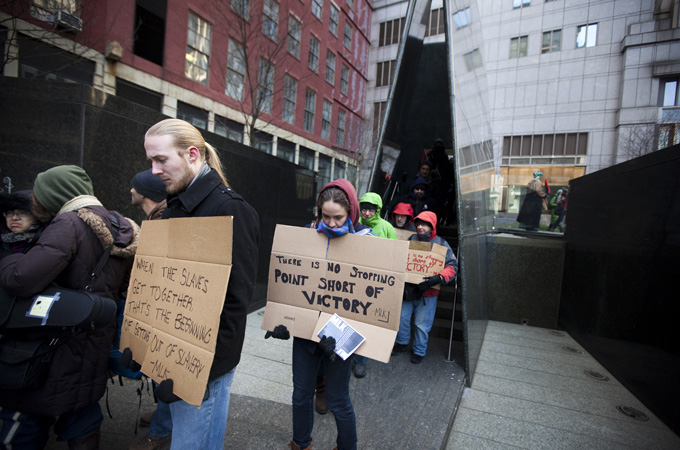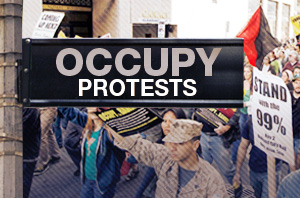
Occupy New York must create meaningful actions that will actually have a concrete impact, says Hamm [GALLO/GETTY]
What's Next For New York?
By Nikolas Kozloff
Last Modified: 10 Feb 2012 13:51
Courtesy Of "Al-Jazeera"
New York, NY - In the wake of Mayor Michael Bloomberg's crackdown on the Occupy movement in Lower Manhattan, there has been a slight lull in activist activity. Yet recently, with disturbances breaking out in the city of Oakland, California, some might have wondered whether Occupy was about to enter "phase two". When activists there attempted to take over a vacant building, the police used teargas and rubber bullets against the protesters, and 400 were arrested. A solidarity march was called the very next day in Lower Manhattan, and as protesters scuffled with police, 12 were arrested there.
 |
| In-depth coverage of the global movement |
Are these developments indicative of a roller coaster political season to come? I recently sat down with Ted Hamm, founding editor of the Brooklyn Rail, a magazine which covers local arts and politics. In addition to his duties at the Rail, Hamm is associate professor of urban studies at Metropolitan College, conveniently located near to the original Occupy encampment in Zucotti Park.
| Nikolas Kozloff: From the very outset of the Occupy movement, there's been a kind of synergy between Oakland and New York. While things have seemingly died down here as of late, Oakland is once again in the headlines. What are the commonalities between the two cities in terms of their respective urban politics and social fabrics, and do you think New York's Occupy movement will once again become more assertive as a result of protest on the west coast? |
Ted Hamm: Well, one interesting comparison has to do with the co-operative movement which exists on both coasts and, actually, one of the larger functioning co-ops is the Park Slope Food Co-op in the outer borough of Brooklyn. I would say there is a radical labour tradition in Oakland as well as a Bay Area activist tradition, and that radical tradition exists here in New York to a certain extent - though it's more difficult to set up co-operative living here because of the high cost of living. Nevertheless, there have been attempts to establish co-operative type living arrangements in New York. For example, during one recent protest in the area of East New York, where an occupy foreclosure set up shop in someone's home. Another interesting point of comparison is labour: a lot of people here in New York are talking about setting up strikes or walkouts on May 1, or May Day. But legally, organised labour can't call for a general strike. And so my question is whether there is support for a general strike here in New York, which would be comparable to pro-labour sentiment in Oakland. Indeed, just recently Oakland launched its own general strike, and I wonder how many people would actually turn out for such an action here in New York? It could wind up simply being a militant cadre of activists who aren't officially going on strike because they're either in school or freelancing. To my mind, that would be a rather lacklustre outcome: a general strike isn't much of a success unless a lot of people participate.
| NK: I have the impression that protests have been more racially diverse in Oakland than in New York. Here at Metropolitan College, you teach many students of colour and I wonder what their reaction was to the protests. Could the Occupy movement do a better job of attracting a more diverse crowd? |
TH: One of the things I've heard from my students is that there is good reason to avoid the protests. There's unease about coming into contact with the police if you have a criminal record. Whether it's simply a trivial charge that you neglected to clear up in court, a more serious arrest record or you're on probation or parole, you need to steer clear of situations where the police are aggressively arresting people. Also, when you go to protest now in the city you never know if you're going to be caught up in orange netting as a mere bystander. You could be on the wrong block at the wrong time. The police have byzantine crowd control tactics and you can never be sure where you stand. In addition, Barack Obama is probably still pretty popular within the African-American community in the city. If you examined a cross section of black New Yorkers they would probably say "why should we be protesting when he's in control?" On the other hand, we can't discount the role of such groups as Occupy the Hood. Students at my own school started this offshoot of the original Occupy movement because they felt that African-Americans weren't sufficiently represented amongst the activist community. One thing that people of colour can bring to these protests is their own day-to-day experience with the police. Indeed, some of my students have actual members of their family working within the police force itself.
| NK: At the national level, Republican presidential candidate Mitt Romney has had difficulty, overcoming the perception that he is "Mr one per cent", and this could be his Achilles Heel come the fall election. In this sense, it could be said that Occupy has helped to change the political conversation in this country. But, do you believe Occupy will change the nature of local politics too, making it more and more difficult for super wealthy individuals such as Mayor Bloomberg to dominate City Hall? What about the New York mayoral election of 2013 - do you think candidates will strike a more populist tone? |
TH: I think New York candidates will put forth a critique which leans towards populism in 2013, perhaps raising such issues as a living wage and renewal of rent control. Right now, Bloomberg seems to be supporting City Council Speaker Christine Quinn. Through Bloomberg's support, Quinn's hoping to get the backing of the elite - and, in particular, the real estate interests, which are in turn linked to the construction industry. She could also appeal to the more conservative unions, such as those of police and firefighters, which are influential come election time. Quinn may position herself as someone who is sympathetic to the 99 per cent, but also willing to work with the one per cent. In the long term, however, I think activists are going to have to figure out a way to put issues on the table effectively because few within the elite are going to be sympathetic towards Occupy. Fundamentally, people need to be realistic about the constraints of city government, and to be honest the City Council doesn't have much power. And let's say Quinn did run a populist campaign and even got elected - what could she do to further social justice? Perhaps the biggest power that she would have is the bully pulpit. But then, when you get into pressing needs like taxing financial transactions - that is something that must happen at the state level. Launching an investigation of Wall Street, meanwhile, corresponds to the office of the state's Attorney General.
| NK: To be sure, Occupy has its own working groups dedicated to arts and culture, yet I wonder whether you think the activists' efforts in this regard have been effective from where you stand at the Rail, a publication which is very much on top of the New York arts scene. |
TH: Personally, I don't think that occupying art galleries or the Museum of Modern Art is really going to make much of a difference. The art world is institutionally driven and activists won't be able to transform that dynamic very easily. On the other hand, the more artists participate in movement politics, the better.
| NK: Your magazine, the Brooklyn Rail, deals with local politics in the borough of Brooklyn which is larger, more diverse and more populous than Manhattan. In a sense it is a little ironic that Occupy should have emerged in Manhattan - which is a wealthy enclave - and not in Brooklyn. How should activists appeal to people in the outer boroughs? |
TH: There are important landmarks in Brooklyn such as the Brooklyn Bridge, but in general the borough lacks those larger-than-life symbolic sites - such as Wall Street - where activists can gather. Nevertheless, a lot of the younger protesters from Occupy are coming out of Brooklyn neighbourhoods like Williamsburg, Bedford-Stuyvesant and Bushwick. And to be fair, there have been some local actions in Brooklyn, bubbling beneath the surface. My concern, however, is that smaller actions haven't been very coherent. Just the other night, for example, activists held a party in Williamsburg to protest property relations. They held the party in a vacant condo which hadn't sold yet, due to the financial crash of 2008. Then the cops showed up and the protesters got into a melee with them. To me it sounded more like mayhem than any organised or coherent message. The challenge then for Occupy New York is to create meaningful actions which will actually have a concrete impact.
Nikolas Kozloff is the founder of the Revolutionary Handbook website. Ted Hamm is the founding editor of arts and politics magazine Brooklyn Rail.




No comments:
Post a Comment